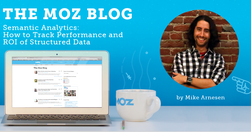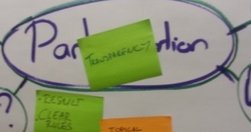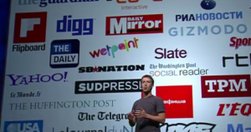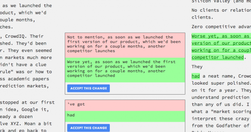Filter 876 resources:
- facebook (337)
- media (127)
- social media (121)
- news (117)
- comments (94)
- disinformation (87)
- community (83)
- medium (75)
- bot (73)
- participation (58)
- algorithm (54)
- mobile (53)
- filter bubble (51)
- data visualisation (42)
- ai (40)
- content strategy (38)
- design (36)
- tool (31)
- eu (30)
- blogging (30)
- curation (29)
- troll (29)
- instant articles (26)
- twitter (26)
- us2020 (26)
- privacy (25)
- platform (25)
- psychology (25)
- politics (23)
- interactive (23)
- promotion (22)
- google (21)
- journalism (20)
- web (20)
- factchecking (20)
- democracy (20)
- advertising (19)
- covid19 (19)
- video (17)
- storytelling (17)
- transparency (17)
- metrics (17)
- regulation (16)
- audiovisual (16)
- ux (16)
- ocm (16)
- analytics (15)
- cms (15)
- data (15)
- trump (14)
- app (14)
- censorship (14)
- trust (14)
- newsletter (13)
- attentionweb (13)
- open web (13)
- amp (13)
- information architecture (13)
- realtime (12)
- data journalism (12)
- animation (12)
- conspiracy (12)
- us (12)
- engagement (12)
- blog (12)
- gamification (11)
- semantic (11)
- egovernment (11)
- linkedin (11)
- native advertising (11)
- livestream (11)
- nytimes (10)
- strategy (10)
- enewsletter (10)
- deletefacebook (9)
- communications (9)
- innovation (9)
- cofoe (9)
- evidence-based policy (9)
- content marketing (9)
- technology (9)
- cambridge analytica (9)
- polarization (8)
- online architecture (8)
- policy (8)
- bloggingportal (8)
- longform (7)
- open source (7)
- minimalist (7)
- productivity (7)
- html5 (7)
- science (7)
- hate (7)
- content (7)
- machine learning (7)
- k4p (7)
- moderation (7)
- myhub (7)
- tv (7)
- newsroom (6)
- delegitimise (6)
- google analytics (6)
- notification (6)
- interface (6)
- web design (6)
- apple (6)
- ec (5)
- ewrc2017 (5)
- blockchain (5)
- qanon (5)
- addiction (5)
- cognitive (5)
- backfire effect (5)
- nlp (5)
- instagram (5)
- knowledge management (5)
- messaging (5)
- peakbot (5)
- augmented reality (5)
- quartz (5)
- event (5)
- ethics (5)
- ea (5)
- clickbait (5)
- guide (4)
- coral (4)
- snapchat (4)
- chat (4)
- psychometrics (4)
- information (4)
- gender (4)
- free (4)
- ai4communities (4)
- marketing (4)
- identity (4)
- ello (4)
- facebook live (4)
- surveillance (4)
- fbpaper (4)
- cookies (4)
- cards (4)
- mybot (4)
- visualisation (4)
- viral (4)
- fediverse (4)
- multilingualism (4)
- sentiment analysis (4)
- science communication (4)
- social marketing (3)
- humour (3)
- digital transformation (3)
- management (3)
- startup (3)
- propaganda (3)
- ui (3)
- conversational (3)
- business model (3)
- audience research (3)
- agile (3)
- publicsphere (3)
- free speech (3)
- internal communications (3)
- big data (3)
- pay4content (3)
- science journalism (3)
- local (3)
- climate (3)
- stream (3)
- buzzfeed (3)
- live (3)
- visual (3)
- uk (3)
- multimedia (3)
- paywall (3)
- conversation (3)
- slack (3)
- copyright (3)
- gdpr (3)
- authenticity (3)
- future (3)
- europcom (3)
- publication (3)
- b2b4me (3)
- election (3)
- ep (3)
- amazon (3)
- responsive (3)
- fblabrats (3)
- paper (3)
- publicsector (3)
- letters2eu (3)
- vandenbrande (3)
- brussels bubble (3)
- collective intelligence (3)
- antitrust (3)
- 2ndbrain (3)
- roamresearch (3)
- echo chamber (3)
- domestic (3)
- listicle (2)
- gawker (2)
- narratives (2)
- twitterenvy (2)
- rss (2)
- nsa (2)
- youth (2)
- ft (2)
- bias (2)
- machine text (2)
- lobby (2)
- youtube (2)
- deep fake (2)
- campaign (2)
- brand (2)
- society (2)
- trending (2)
- zettelkasten (2)
- reddit (2)
- project management (2)
- infographic (2)
- text (2)
- government (2)
- blm (2)
- persuasion (2)
- leadership (2)
- livefyre (2)
- network effect (2)
- bestof2015 (2)
- suppress (2)
- media literacy (2)
- publishing (2)
- canonical debate lab (2)
- credibility (2)
- filter (2)
- groupthink (2)
- brexit (2)
- pilot (2)
- collaboration (2)
- headline (2)
- statistics (2)
- adblock (2)
- mvp (2)
- partisan (2)
- seo (2)
- buzzbot (2)
- faq (2)
- eci (2)
- 3d (2)
- andy matuschak (2)
- jeff jarvis (2)
- hoax (2)
- team (2)
- influence (2)
- tumblr (2)
- gif (2)
- vote (2)
- happiness (2)
- fascism (2)
- cory doctorow (2)
- monopoly (2)
- wearable (2)
- interoperability (2)
- training (2)
- software (2)
- narcissism (2)
- populism (2)
- tribe (2)
- cor (2)
- crowdsourcing (2)
- scrollytelling (2)
- data4policy (2)
- mastodon (2)
- moments (2)
- feed (1)
- mixed reality (1)
- data enrichment (1)
- stack overflow (1)
- seamful (1)
- micro-moment (1)
- d2d (1)
- counter speech (1)
- willpower (1)
- intranet (1)
- datamining (1)
- apple news (1)
- upday (1)
- samsung (1)
- signaltonoise (1)
- webgl (1)
- syndication (1)
- mooc (1)
- membership (1)
- diig (1)
- dao (1)
- smartcities (1)
- epsc (1)
- autonomous (1)
- referendum (1)
- knowledge visualisation (1)
- homepage (1)
- cx (1)
- assist (1)
- europe (1)
- fiction (1)
- tag (1)
- usa (1)
- elon musk (1)
- editorial (1)
- keyword (1)
- buffer (1)
- hype (1)
- ixd (1)
- crisis (1)
- reinventing (1)
- image (1)
- egov (1)
- digg (1)
- self-management (1)
- economics (1)
- open science (1)
- knowledge graph (1)
- d3 (1)
- explainer (1)
- context (1)
- fotl (1)
- millennials (1)
- car (1)
- traffic (1)
- iot (1)
- europa (1)
- ma parent (1)
- roi (1)
- hyperknowledge (1)
- eparltv (1)
- i-book (1)
- photography (1)
- eptv (1)
- trends (1)
- social login (1)
- consultation (1)
- lgbt (1)
- shortform (1)
- icebucketchallenge (1)
- confirmation bias (1)
- google+ (1)
- paid (1)
- chatgpt (1)
- theme (1)
- kpi (1)
- portal (1)
- timeline (1)
- paradigm (1)
- anonymity (1)
- archive (1)
- wayback (1)
- ipad (1)
- taxonomy (1)
- linked data (1)
- ecas (1)
- register (1)
- screencast (1)
- adaptive (1)
- liquid (1)
- chinese (1)
- upworthy (1)
- cmv (1)
- llm (1)
- civil rights (1)
- right (1)
- expiration (1)
- governance (1)
- bloom (1)
- faceted search (1)
- snowden (1)
- internet of things (1)
- convert (1)
- cro (1)
- game (1)
- basic (1)
- customers (1)
- votewatch (1)
- mep (1)
- top3pods (1)
- web2.0 (1)
- podcast (1)
- agent (1)
- mojo (1)
- supergirl (1)
- grassroots (1)
- experiment (1)
- cultural exchange (1)
- humility (1)
- curatorbot (1)
- messenger (1)
- osmo (1)
- language technology (1)
- learn (1)
- debatehub (1)
- ep2014 (1)
- sensecraft (1)
- roaming (1)
- ip (1)
- eesc (1)
- nhscitizen (1)
- visualization (1)
- colfdusion (1)
- (1)
- eu09vs19 (1)
- migration (1)
- sortition (1)
- popvox (1)
- decentralised (1)
- report (1)
- bookmarklet (1)
- post-alpha (1)
- hosted (1)
- geofence (1)
- blackpr (1)
- joan westenberg (1)
- cohesion (1)
- eu2024 (1)
- threadapalooza (1)
- gatsby (1)
- substack (1)
- creativity (1)
- virtual reality (1)
- nz (1)
- sage (1)
- antivaxxer (1)
- rail (1)
- intuition (1)
- model collapse (1)
- circuit-breaker (1)
- at4democracy (1)
- pink slime (1)
- usability (1)
- flicc (1)
- ginsburg (1)
- participatory culture (1)
- ghost (1)
- myanmar (1)
- arg (1)
- floc (1)
- standards (1)
- w3c (1)
- crowdtangle (1)
- github (1)
- opengov (1)
- web development (1)
- motivated (1)
- mobocracy (1)
- demographics (1)
- airbnb (1)
- perception (1)
- crowdfunding (1)
- writing (1)
- quora (1)
- debunk (1)
- inoculation (1)
- comics (1)
- optimisation (1)
- 360video (1)
- metaverse (1)
- spambot (1)
- label (1)
- region (1)
- ipr (1)
- sceptic (1)
- stacked note (1)
- ibm (1)
- intro (1)
- uber (1)
- conference (1)
- design thinking (1)
- jobtodo (1)
- eurosceptics (1)
- customer support (1)
- machine translation (1)
- complex (1)
- automation (1)
- tutorial (1)
- gds (1)
- learning (1)
- khub (1)
- ideation (1)
- euractiv (1)
- empathy (1)
- opinion (1)
- russia (1)
- microsoft (1)
- physics (1)
- holacracy (1)
- reflect (1)
- quiz (1)
- transmedia (1)
- snowfall (1)
- coda (1)
- bbc (1)
- blogpocalypse (1)
- disruption (1)
- hoaxy (1)
- share (1)
- notion (1)
- scandinavia (1)
- competition (1)
- facial blindness (1)
- capgras (1)
- health (1)
- emotion (1)
- how to (1)
- logo (1)
- periscope (1)
- deadbot (1)
- craft (1)
- loyalty (1)
- impact (1)
- vox (1)
- prototype (1)
- knowledge panel (1)
- telegram (1)
- fomo (1)
- education (1)
- city (1)
- wechat (1)
- rantic (1)
- cooperatives (1)
- snapshot (1)
- inscrutable (1)
- transport (1)
- taxibot (1)
- atomisation (1)
- multisig (1)
- dni (1)
- guardian (1)
- ambassador (1)
- newsfeed (1)
- china (1)
- parse.ly (1)
- wapo (1)
- experience (1)
- ethereum (1)
- pwa (1)
Relevant Overviews
Overview: Online Strategy
How should your online presence be shaped?
Is your website working? Do first-time visitors understand what you do, and find the content they need, before clicking away? If not, should you tweak your site or build a new one?
Perhaps you should spend more resources on social, but to do what: engage your audience, convene a community, or simply broadcast your website content?
How can you do both so that your social media presence and your website work together? And what are you measuring, so that you continuously improve?
Need help? Get in touch.
More services: start with Communication strategy.
Relevant resources
Good overview of the year+ - long debate about comments, trolls & social media, "from the baby-and-the-bathwater dept ... This sudden disdain for traditional comments raises the question: is Facebook somehow immune to stupid comments? Is forcing all news conversation on to Facebook's terms really an improvement in meaningful dialogue?... It's lik…

"we’re collecting all the Facebook algorithm factors, updates, and changes that we can find and placing them here in this post for easy reference." - Inside the Facebook News Feed: A List of Algorithm Factors

"Starting in January, in another blow to organic reach, users will see fewer posts that are solely focused on sales or sweepstakes or reuse ad copy.... hundreds of thousands of people said they wanted to see more stories from friends and Pages they care about, and less promotional content.” Well, duh. Who actually WANTS to see promo junk? Be use…

Interesting reaction to Reuters, who argued "Much of the well-informed and articulate discussion around news... has moved to social media and online forums... But is that enough justification for giving up comments? ... not everyone is on Twitter, and not everyone is on Facebook, and so any conversation or interaction that occurs there will be in…

"a closer look at what types of comment sections news organizations are using, and what, if any, value they are adding ... reviewed academic and industry literature, spoke with industry managers and university researchers and conducted a small poll ... The result is a list of questions to ask and best practices for news organizations seeking retu…

"Al Jazeera English ... has developed from a TV channel to a media organisation with a multiplatform offering ranging from written news to interactives.... the outlet uses interactives as a way to offer its audience a fuller picture.... we complement the coverage on all the other platforms and the coverage on TV... Telling stories built with peop…

"How we made our first comics-journalism feature-and the tools for you to make one, too ... We thought we would walk through some of design process and also document some of the code tricks we learned along the way. The final products are a web viewer, Pulp, and the comic-maker interface, Pulp Press... released as a free and open source project…

"Through applying semantic markup to our site, we've embedded an incredibly rich layer of meaningful data in our code.... but don't let the search engines have all the fun; we can use that data, too. By looking at the semantic markup on any given page, we can see what type of "entity" we're looking at ... and its attributes or properties. If we c…

"Swarmize enables journalists to tell new, collaborative stories by making use of real-time data collection and visualisation" Just the tests they've already done are awesome. The code's on GitHub. Think to use in surveys, real-time social media monitoring, live blogs ... anything where real-time is useful and/or you might want a second bite at t…

"Facebook say that the more time users spend at its site, the more likely there will be a robust exchange of diverse viewpoints and ideas shared online. Others fear that users will create their own echo chambers, and filter out coverage they do not agree with. ... [that] “is when you get conspiracy theories.” - How Facebook Is Changing the Way It…

"publishers [could] simply send pages to Facebook ... hosted by its servers ... with ads that Facebook sells. The revenue would be shared. That kind of wholesale transfer of content sends a cold, dark chill down the collective spine of publishers... Media companies would essentially be serfs in a kingdom that Facebook owns." - Facebook Offers Li…

Nothing here about geolocation, augmented reality ... but good points anyway. Via @nosemonkey ""In a world where notifications are full experiences in and of themselves, the screen of app icons makes less and less sense... Why open the Facebook app when you can get the content as a notification and take action... right there at the notification o…
"The Post’s suite of Web apps presents a more specialized alternative to traditional do-it-all content management systems like Drupal... Currently in development at The Post is an application tentatively titled “Storybuilder,” ... including a feature ... to create an index of facts associated with each story. Using this index, Storybuilder could…

"The news media sector has become heavily dependent on traffic from Facebook and Google. A reliance now dangerously close to addiction. Maybe it’s time to refocus on direct access... Which company in the world wouldn’t be seen as fragile when depending so much on a small set of uncontrollable distributors? for a news, value-added type media, the…

After the standard survey of Facebook's impact on news & democracy, an interesting analysis of the way Facebook's: "trending topics has had a deeply pernicious effect on the way news is produced... encourages publications to look for what's trending and pump out something on that subject as quickly as possible... lots of quickly aggregated p…

"With several overlapping features, Facebook's Pages, groups and profiles leave many users confused... each has its own purpose and works for different types of content." - What's Really the Difference Between Facebook Pages, Groups and Profiles?

What happened when 60 odd people had a go at the Participation mindmap?

“Go in and add some information, thank them for finding mistakes, thank them for adding information on their own ... You want to have a dialogue with them.” Well, duh. - Eight best practices for journalists who reply to online comments | Current.org

"trying to game the algorithm doesn’t work, and that the only real secret to getting lots of interaction from Facebook for your content is to create and post great content (this was always Google’s argument as well). But what is great content? ... is it clickbait that drives people to share, or is it in-depth analysis of important topics?... by g…

Transformative civic technology needs to be built “with, not for” a community.... [but] constrained deadlines for development make co-designing with communities a mere exercise at best, an abstract afterthought at worst. If your work is with communities, you better be able to LITERALLY define that community... Once you’ve identified that “who”, L…

"Collaboration on the web has always been a challenge. Beyond the typically one-dimensional CMS, other familiar tools such as Google Docs and Dropbox also fall short because they either lack multimedia support (Docs) or don’t offer a true version control system (Dropbox). Over the past year-and-a-half, however, a host of potential collaboration s…

"The notion that the world outside its homepage remains anonymous is increasingly untrue. Millions of internet users voluntarily give Facebook, Google, and others access to their movements across the web and on mobile when they use “social log in,” or the ability to sign in to a website using credentials from the big identity providers.... as mob…

"... a new way of measuring the actual attention of readers, as part of a move to get publishers and advertisers to stop focusing only on clicks and pageviews... Unlike pageviews, which simply measure whether a page has loaded, or even unique visitors ... metrics like “active exposure time,” ... can determine how much time a reader spent with a s…

""How to stop trolling online?” is the question of the moment. From [Quora's] inception, its efforts have been geared towards “making quality scale,” ... also meant keep making the application a safe place for users to write... It has introduced a new anti-harassment feature, where users are prompted to flag any comment or post ... Quora moderat…
One thing I'm not hearing is whether website owners will be able to use Atlas data to customise their user experience. "Atlas will allow marketers to tap its detailed knowledge of its users to direct ads to those people on thousands of other websites and mobile apps.... Facebook has deep, deep data on its users. You can slice and dice markets, l…

Just substitute 'governments' for 'businesses' and 'brands', 'citizens' for 'customers', and 'policy' for 'product' in this excellent HBR post: "Businesses need to take Ello and its manifesto as a wake-up call to rethink the way they use social networks to reach customers... That means stepping back from the relentless quest for followers, click…

"Facebook executives met with a group of drag queens from San Francisco to discuss the social network’s infamous “real names” policy... Facebook apparently had no intention of negotiating because the policy was crafted for the sale of targeted ads not for the safety of human beings with complex identities.... Facebook appears like a school bully…

Mashable hedges its bets: ""We believe a social network can be a tool for empowerment... Not a tool to deceive, coerce, and manipulate — but a place to connect, create, and celebrate life. You are not a product."" - What's Up With Ello, the Anti-Facebook Social Network?
"But for those searching for what's next, Ello is not it. There have been a few versions of this virtuous social network before—from Diaspora (forgotten), App.net (oof), and even Path (oy) ... [Diaspora] was intended less as an imitation of Facebook than as an escape route from it... New York magazine wrote almost four years ago to the day."

"This is a Big Deal for a lot of people right now, because the software companies that support our social lives have become so evil and pervasive and controlling in recent years." - What Does Ethical Social Networking Software Look Like? — The Message — Medium
Loading more...